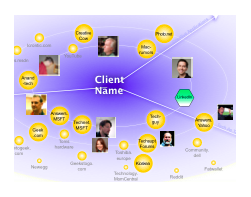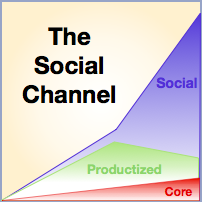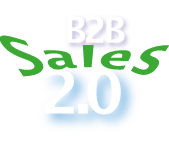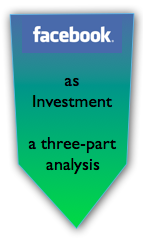 The Digital Social Ecosystem Audit shows you where to interact to produce the best outcomes at the minimal cost, so it is critical to social business initiatives. CSRA launched its “Ecosystem Audit” process in 2008, and we’ve conducted them for many businesses and brands, which get to know the digital world around them in an unprecedented way. Think of the ecosystem audit as an xray of the social ecosystem. Try operating without it ;^) – but most firms do! The Digital Social Ecosystem Audit shows you where to interact to produce the best outcomes at the minimal cost, so it is critical to social business initiatives. CSRA launched its “Ecosystem Audit” process in 2008, and we’ve conducted them for many businesses and brands, which get to know the digital world around them in an unprecedented way. Think of the ecosystem audit as an xray of the social ecosystem. Try operating without it ;^) – but most firms do!
Here I’ll offer my insights into client outcomes as well as how we’ve evolved the process and why. You will get some practical pointers about how you can do your own.
[…]
 Bill Snyder at Infoworld posted some amazing statistics that support the end of social media as we know it, which I predicted in 2009. Marketing and public relations have been losing influence for years because they are impersonal, and people prefer personalized interactions (deep dive here), so marketers and their vendors are grasping at straws. In this context, “social media” has generally been practiced as a shallow promotional activity, and my premise in predicting its demise is that the true potential of social technologies is creating and maintaining relationships, which are based on personalized attention and caring. Bill Snyder at Infoworld posted some amazing statistics that support the end of social media as we know it, which I predicted in 2009. Marketing and public relations have been losing influence for years because they are impersonal, and people prefer personalized interactions (deep dive here), so marketers and their vendors are grasping at straws. In this context, “social media” has generally been practiced as a shallow promotional activity, and my premise in predicting its demise is that the true potential of social technologies is creating and maintaining relationships, which are based on personalized attention and caring.
[…]
Social Channel Three: Using the Social Channel to Defend Native Markets and Penetrate Foreign Markets
 The global Social Channel will reintroduce “home court advantage” to national brands because those that use social business to compete globally by collaborating with users will have the cultural advantage; “foreign” firms may have better product features for the money, but they will not match home brands’ cultural fluency. Personalized service and attention are culturally specific, and deep cultural fluency directly correlates to intimacy. However, brands can only develop the home court advantage by practicing social business at an advanced level. Most have a long way to go and, meanwhile, they will get hammered when they persist in competing on product features in the Productized Channel of Value. The global Social Channel will reintroduce “home court advantage” to national brands because those that use social business to compete globally by collaborating with users will have the cultural advantage; “foreign” firms may have better product features for the money, but they will not match home brands’ cultural fluency. Personalized service and attention are culturally specific, and deep cultural fluency directly correlates to intimacy. However, brands can only develop the home court advantage by practicing social business at an advanced level. Most have a long way to go and, meanwhile, they will get hammered when they persist in competing on product features in the Productized Channel of Value.
The blade cuts both ways: the home court advantage will make exporting to emerging markets much more difficult in the years ahead. The Social Channel will raise the bar because users in all markets will increasingly expect brands to relate to them and to solicit their input and advice. Brands will have to invest significantly in developing in-market social […]
Upgrading the Expert Role for the Knowledge Economy shows how knowledge workers can no longer seek refuge in their core expertise, and how to branch out.

“Experts” are regarded as the foremost authorities in their fields, the glib guru versions notwithstanding. An oft quoted maxim shows why: according to Malcolm Gladwell, for one, it takes 10,000 hours [of study, work] for most people to become expert in something.* On a related front, Naveen Jain posits that experts will be less likely to solve today’s toughest problems because their expertise has become a box around them. All those degrees or promotions within the organization have focused their minds but also closed out creativity. While commenting on his post, I realized that redefining the expert would be necessary in the Knowledge Economy, so here I’ll offer some strategies and tactics for how to practice being an “expert” in the 21st century.
Notably, we can take lessons from experts and apply them to specialists, which are arguably less far along on the same vector—and more common.
[…]
Top B2B Salesperson Trust Killers Revealed discusses the results of targeted B2B sales research I conducted on LinkedIn and features comments from many survey respondents.

One of the key takeaways of The Dynamics of Change video was trust’s importance to B2B prospects’ risk management practices. To explore trust’s importance to B2B sales, I surveyed dozens of seasoned B2B sales executives, including clients and salespeople, in this LinkedIn Poll. The results reveal the nuances of trust and how salespeople must constantly challenge themselves to focus on trust, relationship and execution. For example, respondents said that too many salespeople fumble the ball on fundamentals.
B2B sales is a challenging proposition in normal times, but the challenging global economic malaise has only made budgets tighter and sales more daunting. In large B2B deals, salespeople have to build a significant level of trust with prospects before any deal can be done. This analysis aims to help firm executives and sales leaders improve performance by increasing trust with prospects and clients.
[…]
How Brands Cut Their Exposure to Facebook Business Risk shows how brands can reduce the risks of depending on Facebook too much.

In the Facebook As Investment trilogy, I have analyzed several dimensions of investing in Facebook and raised my doubts about the company’s management and direction. In Part Three, I’ll address how brand executives can insulate themselves from Facebook’s—or any platform’s—fortunes by moving to make their relationships and networks portable. By making and managing investments carefully, brands’ relationships will endure regardless of platforms’ destinies.
By the way, Part One examined how Facebook’s trust gap would make it difficult for Facebook to fully monetize its considerable assets. Part Two analyzed Facebook as a social platform and revealed that it had no competitive threats from other pureplays; rather, the risk was that the whole pureplay category would lose its dominance in 3-5 years.
[…]
 My predictions from the 1990s and beyond about the disruption of “careers” and “work” have been coming true at an increasing pace, so here I’ll offer a quick retrospective of key trends as well as numerous how-to resources for using these disruptions to your advantage. Disruptions change the rules. Although most people don’t like “the rules” at times, we all take comfort in them because we have a clue about how to manage and get what we want. No one likes to feel clueless, but that’s how disruption causes most people to feel, so they try to avoid it. However, by facing the world head on and understanding the profound economic and social changes that are happening, you can see where the proverbial puck will be and skate there before most other people. Let’s go! My predictions from the 1990s and beyond about the disruption of “careers” and “work” have been coming true at an increasing pace, so here I’ll offer a quick retrospective of key trends as well as numerous how-to resources for using these disruptions to your advantage. Disruptions change the rules. Although most people don’t like “the rules” at times, we all take comfort in them because we have a clue about how to manage and get what we want. No one likes to feel clueless, but that’s how disruption causes most people to feel, so they try to avoid it. However, by facing the world head on and understanding the profound economic and social changes that are happening, you can see where the proverbial puck will be and skate there before most other people. Let’s go!
[…]
 Based on numerous executive conversations I’ve had over the past few months, I’m struck by the staying power of 20th century “communications” rules, which still govern many brands today. Therefore, I’ll reveal hidden assumptions that lurk in too many boardrooms in the desire that you root them out before your rivals, so you can outmaneuver them before they disrupt you. Based on numerous executive conversations I’ve had over the past few months, I’m struck by the staying power of 20th century “communications” rules, which still govern many brands today. Therefore, I’ll reveal hidden assumptions that lurk in too many boardrooms in the desire that you root them out before your rivals, so you can outmaneuver them before they disrupt you.
20th century success formulas offer very thin ice on which to skate, and many brands will have a cold awakening. Periods of disruption make assumptions lethal because disruptions change past rules or invalidate them completely, which leads executives and brand stewards astray. In this brief treatement of a complex subject, I’ll show why executives unwittingly sabotage social business’s network-based communications by using mass communications principles.
[…]
Using the Relationship Value Map to Optimize Your Social Networks is a step-by-step approach to prioritizing your firm’s interactions in social networks to significantly improve the return on your team’s time.

CSRA’s Relationship Value Map is a simple but invaluable tool you can use to organize your social networks to meet your personal or business goals better. Its Interest and Trust vectors intersect to create four quadrants for your connections. I designed it when working with individual executive clients in 2009, but CSRA uses it with enterprise clients as well, especially those with direct (B2B) sales forces who need to prioritize their relationship building activities.
[…]
 In An Offer You Can’t Refuse, Lydia Dishman interviews CEO Justin Moore, who discusses his business leadership “lessons learned” from watching The Godfather. It’s a solid post, but very thoughtful and insightful comments take it into classic territory. That said, the post didn’t hit the bullseye for our context here—B2B relationship building—so here goes with the pieces I think it missed. I invite you to add yours in comments. In An Offer You Can’t Refuse, Lydia Dishman interviews CEO Justin Moore, who discusses his business leadership “lessons learned” from watching The Godfather. It’s a solid post, but very thoughtful and insightful comments take it into classic territory. That said, the post didn’t hit the bullseye for our context here—B2B relationship building—so here goes with the pieces I think it missed. I invite you to add yours in comments.
[…]
|
|
 The Digital Social Ecosystem Audit shows you where to interact to produce the best outcomes at the minimal cost, so it is critical to social business initiatives. CSRA launched its “Ecosystem Audit” process in 2008, and we’ve conducted them for many businesses and brands, which get to know the digital world around them in an unprecedented way. Think of the ecosystem audit as an xray of the social ecosystem. Try operating without it ;^) – but most firms do!
The Digital Social Ecosystem Audit shows you where to interact to produce the best outcomes at the minimal cost, so it is critical to social business initiatives. CSRA launched its “Ecosystem Audit” process in 2008, and we’ve conducted them for many businesses and brands, which get to know the digital world around them in an unprecedented way. Think of the ecosystem audit as an xray of the social ecosystem. Try operating without it ;^) – but most firms do!
 Bill Snyder at Infoworld posted some amazing statistics that support the end of social media as we know it, which I predicted in 2009. Marketing and public relations have been losing influence for years because they are impersonal, and people prefer personalized interactions (deep dive here), so marketers and their vendors are grasping at straws. In this context, “social media” has generally been practiced as a shallow promotional activity, and my premise in predicting its demise is that the true potential of social technologies is creating and maintaining relationships, which are based on personalized attention and caring.
Bill Snyder at Infoworld posted some amazing statistics that support the end of social media as we know it, which I predicted in 2009. Marketing and public relations have been losing influence for years because they are impersonal, and people prefer personalized interactions (deep dive here), so marketers and their vendors are grasping at straws. In this context, “social media” has generally been practiced as a shallow promotional activity, and my premise in predicting its demise is that the true potential of social technologies is creating and maintaining relationships, which are based on personalized attention and caring.  The global Social Channel will reintroduce “home court advantage” to national brands because those that use social business to compete globally by collaborating with users will have the cultural advantage; “foreign” firms may have better product features for the money, but they will not match home brands’ cultural fluency. Personalized service and attention are culturally specific, and deep cultural fluency directly correlates to intimacy. However, brands can only develop the home court advantage by practicing social business at an advanced level. Most have a long way to go and, meanwhile, they will get hammered when they persist in competing on product features in the Productized Channel of Value.
The global Social Channel will reintroduce “home court advantage” to national brands because those that use social business to compete globally by collaborating with users will have the cultural advantage; “foreign” firms may have better product features for the money, but they will not match home brands’ cultural fluency. Personalized service and attention are culturally specific, and deep cultural fluency directly correlates to intimacy. However, brands can only develop the home court advantage by practicing social business at an advanced level. Most have a long way to go and, meanwhile, they will get hammered when they persist in competing on product features in the Productized Channel of Value.


 My predictions from the 1990s and beyond about the disruption of “careers” and “work” have been coming true at an increasing pace, so here I’ll offer a quick retrospective of key trends as well as numerous how-to resources for using these disruptions to your advantage. Disruptions change the rules. Although most people don’t like “the rules” at times, we all take comfort in them because we have a clue about how to manage and get what we want. No one likes to feel clueless, but that’s how disruption causes most people to feel, so they try to avoid it. However, by facing the world head on and understanding the profound economic and social changes that are happening, you can see where the proverbial puck will be and skate there before most other people. Let’s go!
My predictions from the 1990s and beyond about the disruption of “careers” and “work” have been coming true at an increasing pace, so here I’ll offer a quick retrospective of key trends as well as numerous how-to resources for using these disruptions to your advantage. Disruptions change the rules. Although most people don’t like “the rules” at times, we all take comfort in them because we have a clue about how to manage and get what we want. No one likes to feel clueless, but that’s how disruption causes most people to feel, so they try to avoid it. However, by facing the world head on and understanding the profound economic and social changes that are happening, you can see where the proverbial puck will be and skate there before most other people. Let’s go! Based on numerous executive conversations I’ve had over the past few months, I’m struck by the staying power of 20th century “communications” rules, which still govern many brands today. Therefore, I’ll reveal hidden assumptions that lurk in too many boardrooms in the desire that you root them out before your rivals, so you can outmaneuver them before they disrupt you.
Based on numerous executive conversations I’ve had over the past few months, I’m struck by the staying power of 20th century “communications” rules, which still govern many brands today. Therefore, I’ll reveal hidden assumptions that lurk in too many boardrooms in the desire that you root them out before your rivals, so you can outmaneuver them before they disrupt you.